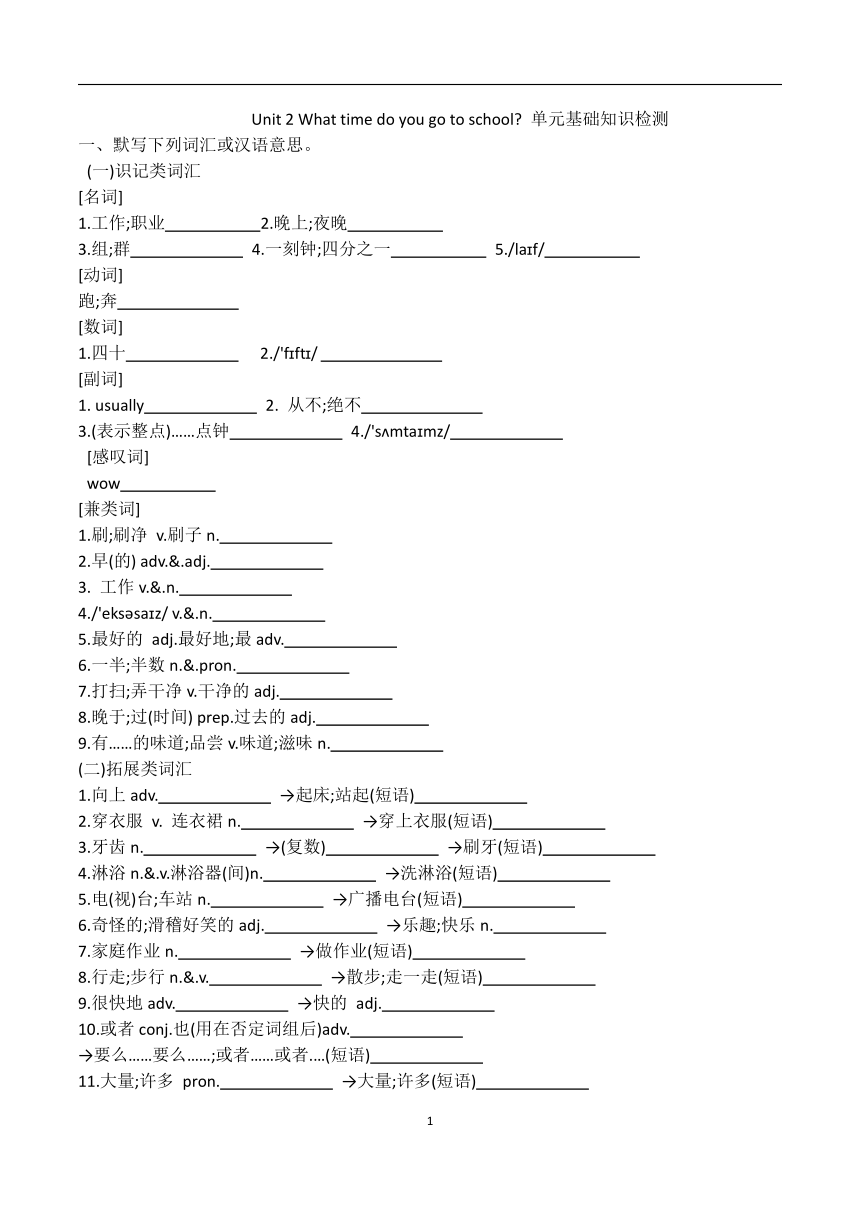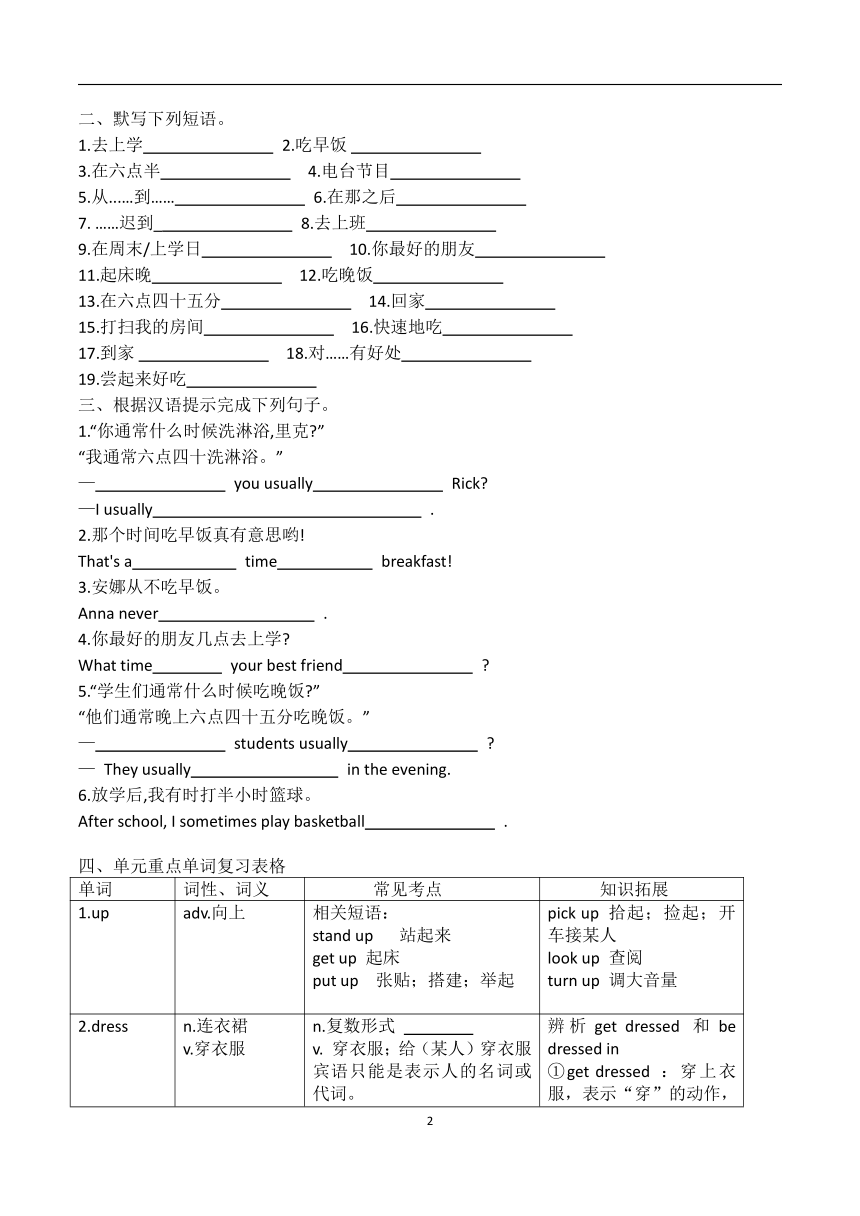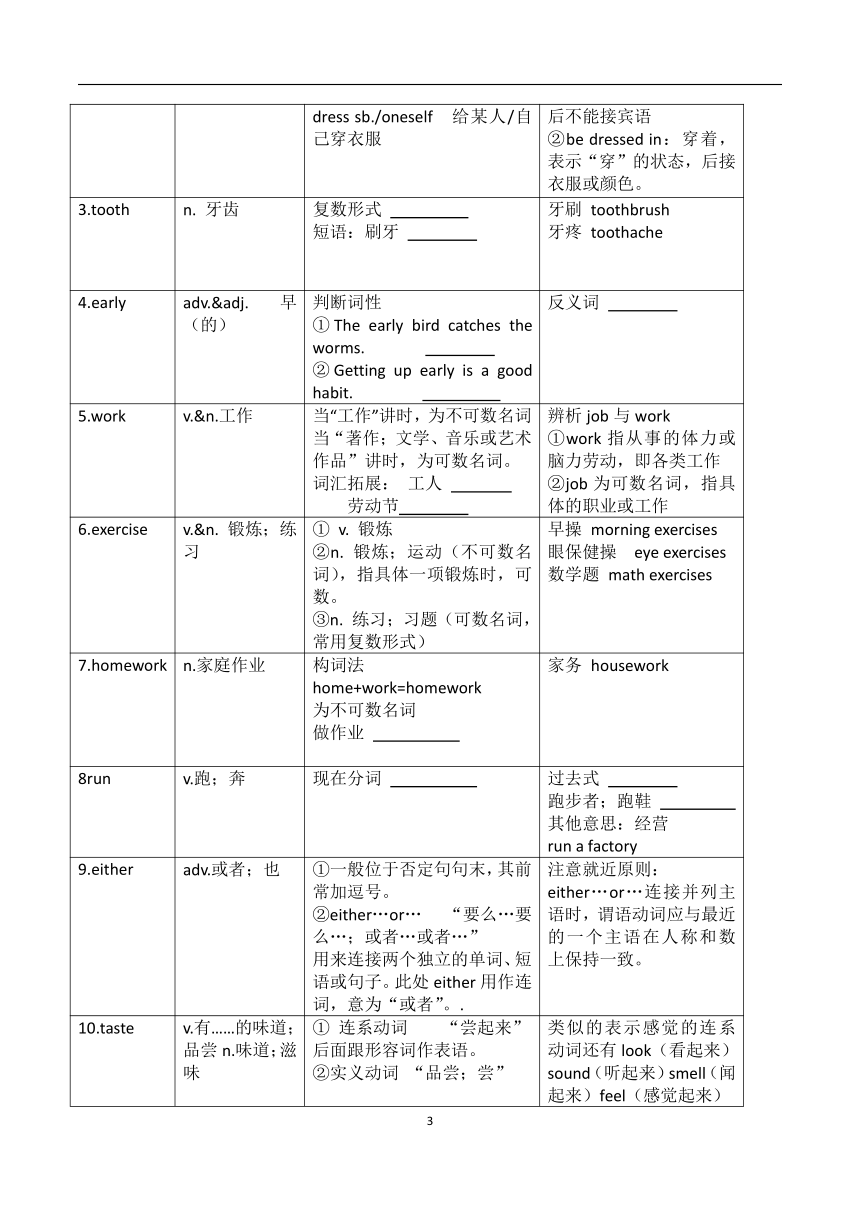七年级下册unit2 What time do you go to school 基础知识梳理及练习(含答案)
文档属性
| 名称 | 七年级下册unit2 What time do you go to school 基础知识梳理及练习(含答案) |

|
|
| 格式 | docx | ||
| 文件大小 | 44.3KB | ||
| 资源类型 | 教案 | ||
| 版本资源 | 人教新目标(Go for it)版 | ||
| 科目 | 英语 | ||
| 更新时间 | 2024-03-11 17:14:50 | ||
图片预览




文档简介
Unit 2 What time do you go to school 单元基础知识检测
默写下列词汇或汉语意思。
(一)识记类词汇
[名词]
1.工作;职业 2.晚上;夜晚
3.组;群 4.一刻钟;四分之一 5./la f/
[动词]
跑;奔
[数词]
1.四十 2./'f ft /
[副词]
1. usually 2. 从不;绝不
3.(表示整点)……点钟 4./'s mta mz/
[感叹词]
wow
[兼类词]
1.刷;刷净 v.刷子n.
2.早(的) adv.&.adj.
3. 工作v.&.n.
4./'eks sa z/ v.&.n.
5.最好的 adj.最好地;最adv.
6.一半;半数n.&.pron.
7.打扫;弄干净v.干净的adj.
8.晚于;过(时间) prep.过去的adj.
9.有……的味道;品尝v.味道;滋味n.
(二)拓展类词汇
1.向上adv. →起床;站起(短语)
2.穿衣服 v. 连衣裙n. →穿上衣服(短语)
3.牙齿n. →(复数) →刷牙(短语)
4.淋浴n.&.v.淋浴器(间)n. →洗淋浴(短语)
5.电(视)台;车站n. →广播电台(短语)
6.奇怪的;滑稽好笑的adj. →乐趣;快乐n.
7.家庭作业n. →做作业(短语)
8.行走;步行n.&.v. →散步;走一走(短语)
9.很快地adv. →快的 adj.
10.或者conj.也(用在否定词组后)adv.
→要么……要么……;或者……或者.…(短语)
11.大量;许多 pron. →大量;许多(短语)
二、默写下列短语。
1.去上学 2.吃早饭
3.在六点半 4.电台节目
5.从...…到…… 6.在那之后
7. ……迟到_ 8.去上班
9.在周末/上学日 10.你最好的朋友
11.起床晚 12.吃晚饭
13.在六点四十五分 14.回家
15.打扫我的房间 16.快速地吃
17.到家 18.对……有好处
19.尝起来好吃
三、根据汉语提示完成下列句子。
1.“你通常什么时候洗淋浴,里克 ”
“我通常六点四十洗淋浴。”
— you usually Rick
—I usually .
2.那个时间吃早饭真有意思哟!
That's a time breakfast!
3.安娜从不吃早饭。
Anna never .
4.你最好的朋友几点去上学
What time your best friend
5.“学生们通常什么时候吃晚饭 ”
“他们通常晚上六点四十五分吃晚饭。”
— students usually
— They usually in the evening.
6.放学后,我有时打半小时篮球。
After school, I sometimes play basketball .
四、单元重点单词复习表格
单词 词性、词义 常见考点 知识拓展
1.up adv.向上 相关短语: stand up 站起来 get up 起床 put up 张贴;搭建;举起 pick up 拾起;捡起;开车接某人 look up 查阅 turn up 调大音量
2.dress n.连衣裙 v.穿衣服 n.复数形式 v. 穿衣服;给(某人)穿衣服 宾语只能是表示人的名词或代词。 dress sb./oneself 给某人/自己穿衣服 辨析get dressed 和be dressed in ①get dressed :穿上衣服,表示“穿”的动作,后不能接宾语 ②be dressed in:穿着,表示“穿”的状态,后接衣服或颜色。
3.tooth n. 牙齿 复数形式 短语:刷牙 牙刷 toothbrush 牙疼 toothache
4.early adv.&adj.早(的) 判断词性 ①The early bird catches the worms. ②Getting up early is a good habit. 反义词
5.work v.&n.工作 当“工作”讲时,为不可数名词 当“著作;文学、音乐或艺术作品”讲时,为可数名词。 词汇拓展: 工人 劳动节 辨析job与work ①work指从事的体力或脑力劳动,即各类工作
②job为可数名词,指具体的职业或工作
6.exercise v.&n. 锻炼;练习 ① v. 锻炼 ②n. 锻炼;运动(不可数名词),指具体一项锻炼时,可数。 ③n. 练习;习题(可数名词,常用复数形式) 早操 morning exercises 眼保健操 eye exercises 数学题 math exercises
7.homework n.家庭作业 构词法 home+work=homework 为不可数名词 做作业 家务 housework
8run v.跑;奔 现在分词 过去式 跑步者;跑鞋 其他意思:经营 run a factory
9.either adv.或者;也 ①一般位于否定句句末,其前常加逗号。 ②either…or… “要么…要么…;或者…或者…” 用来连接两个独立的单词、短语或句子。此处either用作连词,意为“或者”。. 注意就近原则: either…or…连接并列主语时,谓语动词应与最近的一个主语在人称和数上保持一致。
10.taste v.有……的味道;品尝n.味道;滋味 ① 连系动词 “尝起来” 后面跟形容词作表语。 ②实义动词 “品尝;尝” 类似的表示感觉的连系动词还有look(看起来)sound(听起来)smell(闻起来)feel(感觉起来)
11.life n.生活;生命 过一个……的生活 live a ……life 当“生命”讲 复数形式 类记:half
五、易混词义辨析
易混词(组)
4个“穿” ①wear 表示穿的状态 ②put on表示穿的动作 ③be in+颜色,表示穿着某种颜色的衣服 ④dress sb.给某人穿衣服 He wears a coat. Put on your coat. The boy in black is Tom. The little boy can dress himself.
时间介词3个“在” ①at其后一般跟表示钟点的词,如at nine o’clock。at还可以用在某些固定短语中,如at night, at noon ②on用在日期、星期几、节日等具体某天前,也用来表示在具体某天的上午、下午或晚上。 on Monday on November 20th on Children’s Day on Friday morning on the afternoon of May 8th ③in用在月份、季节、年份等前面,也可以表示在上午、下午或晚上。 in March in 2020 in winter in the morning 助记口诀: on后具体某一天,日期、星期、节日前。 at用在时刻前,也与正午、午夜连。 月份、季节与年份, in须用在其前面。
3个“许多” ①lots of… (=a lot of)大量;许多既可以修饰可数名词复数,又可以修饰不可数名词,用于肯定句中。 ②many后加可数名词复数; ③much后加不可数名词。 拓展:too many 太多 too much 太多 用法同many 和much
2个 “什么时候” ①what time询问具体时刻 ②when询问年份、月份、日期,也可以询问时刻 What time/ when do you usually go to school
六、重难点辨析
重难点1 never的用法
1. She is always the first student to get to school. She's n late.
2. Frank watches TV too late at night, because he wants to get up early the next day.
A. never B. also C. usually D.always
3. Andy doesn't like junk food at all, so he eats it.
A. often B. sometimes C. usually D. never
4.冰激淋不健康,因此我从不吃它。
Ice-cream is not healthy, so I it.
重难点2 work/job辨析
1. I often go swimming with my best friend after .
2. I tell stories to old people in the old people's home. This is a good for me. I usually go to early.
3. 我的哥哥找到了一份新的工作,他必须每天工作十个小时。
My brother finds a new and he must for ten hours every day.
重难点3 either 的用法
1. You can come on e Saturday or Sunday because I must be at work on weekdays.
2. Either Linda or her brother (do) the dishes after dinner on Saturdays.
3. I can't play the violin. And I can't play the guitar, .
A. either B. also C. too D. and
4.要么你,要么他帮我们学英语。
you he us with English.
重难点 4 taste的用法
1. The food (尝起来)good so we all like it.
2. —How do you like this cup of Xinglong Coffee
—It really great. I'd like another cup.
A. looks B. feels C. tastes
3. Hamburgers are my favorite food. They very good.
A. sound B. taste C. look D. show
重难点5 at/in/on 辨析
1. We have a history class three o'clock every Friday afternoon.
A.at B. on C. in D. to
2. Father's Day comes June every year.
A.in B. on C.at D.to
3.Shenzhou XIII came back to Earth safely April 16th, 2022.
A. at B. on C. In
4.— I usually get up six.
—Oh, me too.
A.at B.in C. of D. on
七、语法知识练习
一般现在时的用法
一、用括号中所给单词的适当形式填空。
1. They often (go) to school at half past six.
2. Alice (do) her homework at school every day.
3. Bob(take) a shower in the evening or in the morning
4. What your mother often (do) after dinner
5. What time Jack and his sister (eat) lunch
二、用方框中所给单词的适当形式填空。
brush taste clean take
1. He gets up and his teeth at six o'clock in the morning.
2. My parents always a walk after dinner.
3. Ice-cream good, but it isn't healthy.
4. They their classroom every day.
三、单项选择。
1. Her sister up at 6:30 every day.
A. get B. gets C. is getting D. are getting
2.— do you get to school
— At eight o'clock.
A. What time B. Where C. How D. Why
3. Does your friend Jim at 5:30 in the afternoon
A. exercises B. to exercise C. exercising D. exercise
4. — What time does Lisa after school
—At six o'clock.
A. do her homework B. does her homework
C. do her homeworks D. does her homeworks
5. Bob his homework Sundays.
A. doesn't; on B. don't do; in C. doesn't do; on D. doesn't; in
6.— What does your brother after school
— He usually basketball.
A. do; plays B. does; play
C. do;play D. does;plays
四、句型转换。
1. Does your father go to work at 7:00 (作否定回答)
,he .
2. He takes a shower every day.(改为否定句)
He a shower every day.
3. Peter often plays basketball with his best friend after school. (对画线部分提问)
Peter often play basketball with his best friend
4. My parents often exercise in the morning.(改为一般疑问句)
often in the morning
5. Tom goes to work at 8:00 a.m.(改为一般疑问句)
Tom to work at 8:00 a. m.
Unit 2 默写知识梳理
一、(一)[名词] 1. job 2. night 3. group4. quarter 5. life
[动词] run
[数词] 1.forty 2. fifty
[副词]1. 通常地;一般地2. never 3. o'clock 4. sometimes
[感叹词](表示惊奇或敬佩)哇;呀
[兼类词]1. brush 2. early 3. work
4. exercise 5. best 6. half 7.clean
8. past 9. taste
(二) 1. up; get up2. dress; get dressed3. tooth; teeth; brush teeth4. shower; take a shower
5.station; radio station6.funny; fun7. homework; do (one's ) homework
8. walk; take a walk9. quickly; quick10. either; either ... or ... 11. lot; lots of
二、1. go to school 2. eat breakfast 3. at six thirty 4. radio show5. from ... to ...
6. after that 7. be late for ...8. go to work
9. on weekends/school days 10. your best friend 11. get up late 12. eat dinner
13. at a quarter to seven 14. go home 15. clean my room 16. eat quickly
17. get home 18. be good for ... 19. taste good
三、1.What time do; take a shower; take a shower at six forty 2. funny; for
3. eats breakfast 4. does; go to school
5. When do; eat dinner; eat dinner at a quarter to seven
6. for half an hour
六、重难点1
1. never
2.A 句意: Frank晚上看电视从不看得太晚,因为他想
第二天早点起床。
3.D 句意:Andy一点都不喜欢垃圾食品,所以他从不吃。
4. never eat
重难点2
1. work 2. job; work 3. job; work
重难点3
1. either 2. does
3.A 句意:我不会拉小提琴。我也不会弹吉他。either,also,too 都表示“也”,但 either用于否定句的句末;also用于肯定句的句中;too用于肯定句的句末。句子是否定句,应用 either。
4. Either; or; helps
重难点 4
1. tastes
2.C 根据想再来一杯可知,咖啡应是尝起来不错。
3.B 句意:汉堡包是我最喜欢的食物。它们尝起来很好吃。根据“Hamburgers are my favorite food.”可知,汉堡包尝起来很好。
重难点5
1.A 句意:每周五下午三点我们有一节历史课。介词at后接钟点,为固定用法。
2.A 句意:每年父亲节都在六月份。“in十月份”属于固定搭配。
3.B 句意:神舟十三号于2022年4月16日安全返回地球。根据“April 16th,2022”可知,指具体某一天,用介词on.
4.A 句意:“我通常六点起床。”“哦,我也是。”由空格后six可知,at 符合语境,at six 意为“在六点钟”。
七、语法练习答案:
答案:
一、1.go 2. does 3. Does; take 4.does; do5. do; eat
二、1.brushes 2. take 3. tastes 4.clean
三、1.B 句意:她姐姐每天六点半起床。根据时间状语every day 可知,句子的时态为一般现在时;又因主语Her sister 为第三人称单数,谓语动词应使用第三人称单数形式。
2.A 句意:“你几点到达学校 ”“八点钟。”根据答句可知,问句是询问时间。
3.D 以助动词 does 开头的一般疑问句,后面的动词应用原形。
4.A 句意:“放学后,Lisa几点做作业 ”“六点钟。”homework是不可数名词;在一般现在时的一般疑问句中,要借助助动词do或does构成疑问句,后面的动词使用原形。
5.C 句意:Bob 在周日不做他的家庭作业。主语Bob是第三人称单数,应用doesn't,其后应用动词原形。do one's homework为固定短语;on Sundays在星期日。
6.A 句意:“放学后你的哥哥做什么 ”“他通常打篮球。”第一句话是特殊疑问句,句中使用了助动词,后面应跟动词原形;第二句话的主语为第三人称单数,故play后面应加s。
四、1.No; doesn't2. doesn't take 3. When does
4. Do your parents; exercise 5.Does; go
4
默写下列词汇或汉语意思。
(一)识记类词汇
[名词]
1.工作;职业 2.晚上;夜晚
3.组;群 4.一刻钟;四分之一 5./la f/
[动词]
跑;奔
[数词]
1.四十 2./'f ft /
[副词]
1. usually 2. 从不;绝不
3.(表示整点)……点钟 4./'s mta mz/
[感叹词]
wow
[兼类词]
1.刷;刷净 v.刷子n.
2.早(的) adv.&.adj.
3. 工作v.&.n.
4./'eks sa z/ v.&.n.
5.最好的 adj.最好地;最adv.
6.一半;半数n.&.pron.
7.打扫;弄干净v.干净的adj.
8.晚于;过(时间) prep.过去的adj.
9.有……的味道;品尝v.味道;滋味n.
(二)拓展类词汇
1.向上adv. →起床;站起(短语)
2.穿衣服 v. 连衣裙n. →穿上衣服(短语)
3.牙齿n. →(复数) →刷牙(短语)
4.淋浴n.&.v.淋浴器(间)n. →洗淋浴(短语)
5.电(视)台;车站n. →广播电台(短语)
6.奇怪的;滑稽好笑的adj. →乐趣;快乐n.
7.家庭作业n. →做作业(短语)
8.行走;步行n.&.v. →散步;走一走(短语)
9.很快地adv. →快的 adj.
10.或者conj.也(用在否定词组后)adv.
→要么……要么……;或者……或者.…(短语)
11.大量;许多 pron. →大量;许多(短语)
二、默写下列短语。
1.去上学 2.吃早饭
3.在六点半 4.电台节目
5.从...…到…… 6.在那之后
7. ……迟到_ 8.去上班
9.在周末/上学日 10.你最好的朋友
11.起床晚 12.吃晚饭
13.在六点四十五分 14.回家
15.打扫我的房间 16.快速地吃
17.到家 18.对……有好处
19.尝起来好吃
三、根据汉语提示完成下列句子。
1.“你通常什么时候洗淋浴,里克 ”
“我通常六点四十洗淋浴。”
— you usually Rick
—I usually .
2.那个时间吃早饭真有意思哟!
That's a time breakfast!
3.安娜从不吃早饭。
Anna never .
4.你最好的朋友几点去上学
What time your best friend
5.“学生们通常什么时候吃晚饭 ”
“他们通常晚上六点四十五分吃晚饭。”
— students usually
— They usually in the evening.
6.放学后,我有时打半小时篮球。
After school, I sometimes play basketball .
四、单元重点单词复习表格
单词 词性、词义 常见考点 知识拓展
1.up adv.向上 相关短语: stand up 站起来 get up 起床 put up 张贴;搭建;举起 pick up 拾起;捡起;开车接某人 look up 查阅 turn up 调大音量
2.dress n.连衣裙 v.穿衣服 n.复数形式 v. 穿衣服;给(某人)穿衣服 宾语只能是表示人的名词或代词。 dress sb./oneself 给某人/自己穿衣服 辨析get dressed 和be dressed in ①get dressed :穿上衣服,表示“穿”的动作,后不能接宾语 ②be dressed in:穿着,表示“穿”的状态,后接衣服或颜色。
3.tooth n. 牙齿 复数形式 短语:刷牙 牙刷 toothbrush 牙疼 toothache
4.early adv.&adj.早(的) 判断词性 ①The early bird catches the worms. ②Getting up early is a good habit. 反义词
5.work v.&n.工作 当“工作”讲时,为不可数名词 当“著作;文学、音乐或艺术作品”讲时,为可数名词。 词汇拓展: 工人 劳动节 辨析job与work ①work指从事的体力或脑力劳动,即各类工作
②job为可数名词,指具体的职业或工作
6.exercise v.&n. 锻炼;练习 ① v. 锻炼 ②n. 锻炼;运动(不可数名词),指具体一项锻炼时,可数。 ③n. 练习;习题(可数名词,常用复数形式) 早操 morning exercises 眼保健操 eye exercises 数学题 math exercises
7.homework n.家庭作业 构词法 home+work=homework 为不可数名词 做作业 家务 housework
8run v.跑;奔 现在分词 过去式 跑步者;跑鞋 其他意思:经营 run a factory
9.either adv.或者;也 ①一般位于否定句句末,其前常加逗号。 ②either…or… “要么…要么…;或者…或者…” 用来连接两个独立的单词、短语或句子。此处either用作连词,意为“或者”。. 注意就近原则: either…or…连接并列主语时,谓语动词应与最近的一个主语在人称和数上保持一致。
10.taste v.有……的味道;品尝n.味道;滋味 ① 连系动词 “尝起来” 后面跟形容词作表语。 ②实义动词 “品尝;尝” 类似的表示感觉的连系动词还有look(看起来)sound(听起来)smell(闻起来)feel(感觉起来)
11.life n.生活;生命 过一个……的生活 live a ……life 当“生命”讲 复数形式 类记:half
五、易混词义辨析
易混词(组)
4个“穿” ①wear 表示穿的状态 ②put on表示穿的动作 ③be in+颜色,表示穿着某种颜色的衣服 ④dress sb.给某人穿衣服 He wears a coat. Put on your coat. The boy in black is Tom. The little boy can dress himself.
时间介词3个“在” ①at其后一般跟表示钟点的词,如at nine o’clock。at还可以用在某些固定短语中,如at night, at noon ②on用在日期、星期几、节日等具体某天前,也用来表示在具体某天的上午、下午或晚上。 on Monday on November 20th on Children’s Day on Friday morning on the afternoon of May 8th ③in用在月份、季节、年份等前面,也可以表示在上午、下午或晚上。 in March in 2020 in winter in the morning 助记口诀: on后具体某一天,日期、星期、节日前。 at用在时刻前,也与正午、午夜连。 月份、季节与年份, in须用在其前面。
3个“许多” ①lots of… (=a lot of)大量;许多既可以修饰可数名词复数,又可以修饰不可数名词,用于肯定句中。 ②many后加可数名词复数; ③much后加不可数名词。 拓展:too many 太多 too much 太多 用法同many 和much
2个 “什么时候” ①what time询问具体时刻 ②when询问年份、月份、日期,也可以询问时刻 What time/ when do you usually go to school
六、重难点辨析
重难点1 never的用法
1. She is always the first student to get to school. She's n late.
2. Frank watches TV too late at night, because he wants to get up early the next day.
A. never B. also C. usually D.always
3. Andy doesn't like junk food at all, so he eats it.
A. often B. sometimes C. usually D. never
4.冰激淋不健康,因此我从不吃它。
Ice-cream is not healthy, so I it.
重难点2 work/job辨析
1. I often go swimming with my best friend after .
2. I tell stories to old people in the old people's home. This is a good for me. I usually go to early.
3. 我的哥哥找到了一份新的工作,他必须每天工作十个小时。
My brother finds a new and he must for ten hours every day.
重难点3 either 的用法
1. You can come on e Saturday or Sunday because I must be at work on weekdays.
2. Either Linda or her brother (do) the dishes after dinner on Saturdays.
3. I can't play the violin. And I can't play the guitar, .
A. either B. also C. too D. and
4.要么你,要么他帮我们学英语。
you he us with English.
重难点 4 taste的用法
1. The food (尝起来)good so we all like it.
2. —How do you like this cup of Xinglong Coffee
—It really great. I'd like another cup.
A. looks B. feels C. tastes
3. Hamburgers are my favorite food. They very good.
A. sound B. taste C. look D. show
重难点5 at/in/on 辨析
1. We have a history class three o'clock every Friday afternoon.
A.at B. on C. in D. to
2. Father's Day comes June every year.
A.in B. on C.at D.to
3.Shenzhou XIII came back to Earth safely April 16th, 2022.
A. at B. on C. In
4.— I usually get up six.
—Oh, me too.
A.at B.in C. of D. on
七、语法知识练习
一般现在时的用法
一、用括号中所给单词的适当形式填空。
1. They often (go) to school at half past six.
2. Alice (do) her homework at school every day.
3. Bob(take) a shower in the evening or in the morning
4. What your mother often (do) after dinner
5. What time Jack and his sister (eat) lunch
二、用方框中所给单词的适当形式填空。
brush taste clean take
1. He gets up and his teeth at six o'clock in the morning.
2. My parents always a walk after dinner.
3. Ice-cream good, but it isn't healthy.
4. They their classroom every day.
三、单项选择。
1. Her sister up at 6:30 every day.
A. get B. gets C. is getting D. are getting
2.— do you get to school
— At eight o'clock.
A. What time B. Where C. How D. Why
3. Does your friend Jim at 5:30 in the afternoon
A. exercises B. to exercise C. exercising D. exercise
4. — What time does Lisa after school
—At six o'clock.
A. do her homework B. does her homework
C. do her homeworks D. does her homeworks
5. Bob his homework Sundays.
A. doesn't; on B. don't do; in C. doesn't do; on D. doesn't; in
6.— What does your brother after school
— He usually basketball.
A. do; plays B. does; play
C. do;play D. does;plays
四、句型转换。
1. Does your father go to work at 7:00 (作否定回答)
,he .
2. He takes a shower every day.(改为否定句)
He a shower every day.
3. Peter often plays basketball with his best friend after school. (对画线部分提问)
Peter often play basketball with his best friend
4. My parents often exercise in the morning.(改为一般疑问句)
often in the morning
5. Tom goes to work at 8:00 a.m.(改为一般疑问句)
Tom to work at 8:00 a. m.
Unit 2 默写知识梳理
一、(一)[名词] 1. job 2. night 3. group4. quarter 5. life
[动词] run
[数词] 1.forty 2. fifty
[副词]1. 通常地;一般地2. never 3. o'clock 4. sometimes
[感叹词](表示惊奇或敬佩)哇;呀
[兼类词]1. brush 2. early 3. work
4. exercise 5. best 6. half 7.clean
8. past 9. taste
(二) 1. up; get up2. dress; get dressed3. tooth; teeth; brush teeth4. shower; take a shower
5.station; radio station6.funny; fun7. homework; do (one's ) homework
8. walk; take a walk9. quickly; quick10. either; either ... or ... 11. lot; lots of
二、1. go to school 2. eat breakfast 3. at six thirty 4. radio show5. from ... to ...
6. after that 7. be late for ...8. go to work
9. on weekends/school days 10. your best friend 11. get up late 12. eat dinner
13. at a quarter to seven 14. go home 15. clean my room 16. eat quickly
17. get home 18. be good for ... 19. taste good
三、1.What time do; take a shower; take a shower at six forty 2. funny; for
3. eats breakfast 4. does; go to school
5. When do; eat dinner; eat dinner at a quarter to seven
6. for half an hour
六、重难点1
1. never
2.A 句意: Frank晚上看电视从不看得太晚,因为他想
第二天早点起床。
3.D 句意:Andy一点都不喜欢垃圾食品,所以他从不吃。
4. never eat
重难点2
1. work 2. job; work 3. job; work
重难点3
1. either 2. does
3.A 句意:我不会拉小提琴。我也不会弹吉他。either,also,too 都表示“也”,但 either用于否定句的句末;also用于肯定句的句中;too用于肯定句的句末。句子是否定句,应用 either。
4. Either; or; helps
重难点 4
1. tastes
2.C 根据想再来一杯可知,咖啡应是尝起来不错。
3.B 句意:汉堡包是我最喜欢的食物。它们尝起来很好吃。根据“Hamburgers are my favorite food.”可知,汉堡包尝起来很好。
重难点5
1.A 句意:每周五下午三点我们有一节历史课。介词at后接钟点,为固定用法。
2.A 句意:每年父亲节都在六月份。“in十月份”属于固定搭配。
3.B 句意:神舟十三号于2022年4月16日安全返回地球。根据“April 16th,2022”可知,指具体某一天,用介词on.
4.A 句意:“我通常六点起床。”“哦,我也是。”由空格后six可知,at 符合语境,at six 意为“在六点钟”。
七、语法练习答案:
答案:
一、1.go 2. does 3. Does; take 4.does; do5. do; eat
二、1.brushes 2. take 3. tastes 4.clean
三、1.B 句意:她姐姐每天六点半起床。根据时间状语every day 可知,句子的时态为一般现在时;又因主语Her sister 为第三人称单数,谓语动词应使用第三人称单数形式。
2.A 句意:“你几点到达学校 ”“八点钟。”根据答句可知,问句是询问时间。
3.D 以助动词 does 开头的一般疑问句,后面的动词应用原形。
4.A 句意:“放学后,Lisa几点做作业 ”“六点钟。”homework是不可数名词;在一般现在时的一般疑问句中,要借助助动词do或does构成疑问句,后面的动词使用原形。
5.C 句意:Bob 在周日不做他的家庭作业。主语Bob是第三人称单数,应用doesn't,其后应用动词原形。do one's homework为固定短语;on Sundays在星期日。
6.A 句意:“放学后你的哥哥做什么 ”“他通常打篮球。”第一句话是特殊疑问句,句中使用了助动词,后面应跟动词原形;第二句话的主语为第三人称单数,故play后面应加s。
四、1.No; doesn't2. doesn't take 3. When does
4. Do your parents; exercise 5.Does; go
4
同课章节目录
- Unit 1 Can you play the guitar?
- Section A
- Section B
- Unit 2 What time do you go to school?
- Section A
- Section B
- Unit 3 How do you get to school?
- Section A
- Section B
- Unit 4 Don't eat in class.
- Section A
- Section B
- Unit 5 Why do you like pandas?
- Section A
- Section B
- Unit 6 I'm watching TV.
- Section A
- Section B
- Review of Units 1-6
- Unit 7 It's raining!
- Section A
- Section B
- Unit 8 Is there a post office near here?
- Section A
- Section B
- Unit 9 What does he look like?
- Section A
- Section B
- Unit 10 I'd like some noodles.
- Section A
- Section B
- Unit 11 How was your school trip?
- Section A
- Section B
- Unit 12 What did you do last weekend?
- Section A
- Section B
